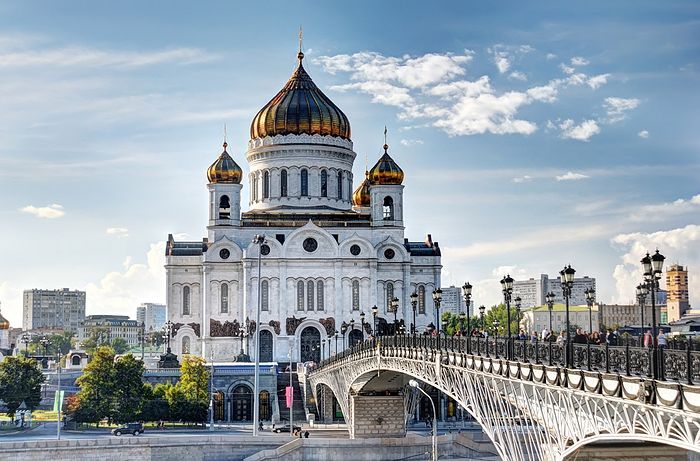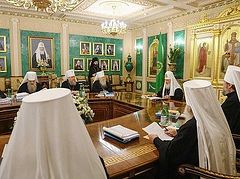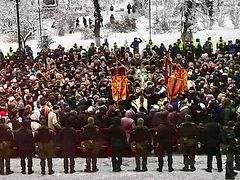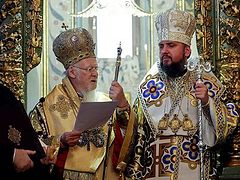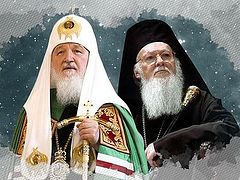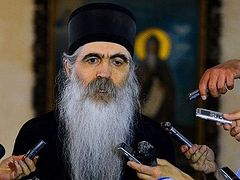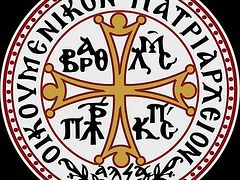On June 27th, 2008, the Bishops Council of the Russian Orthodox Church, at a plenary meeting, adopted the resolution “On the Unity of the Church”. We have provided a full translation of it here because of its far-reaching importance and relevance to today’s grievous situation in Ukraine.
On this day of the Triumph of Orthodoxy, it is our fervent hope and prayer that the current threat to Orthodox Unity be speedily overcome, and the machinations of the Church’s enemies be roundly thwarted.
Unity is one of the essential characteristics of the Church. According to the teachings of the holy Apostle Paul, the Church is the Body of Christ, of which every Christian is a member: Now ye are the body of Christ, and members in particular (1 Cor. 12:27). The members of the one and only Body of Christ are bound together by one faith, and Baptism, united together with Love in the image of the mutual love of the Three Persons of the Divine and Life-Giving Trinity.
The Orthodox confession of faith in the Holy Trinity requires from every Christian an athletic-ascetic effort aimed at preserving the precious gift of Unity, which stretches beyond all existing borders, political divisions, and all common human differences.
This “Sacrament of Unity” and this “Union of Indivisible Concord”, concerning which Hieromartyr Cyprian of Carthage spoke, must be carefully preserved. With the loss of the unity of the Church, true faith is also lost. “Is it possible for anyone who does not keep to the unity of the Church, to think that he keeps the faith?” the Hieromartyr asks. “Can anyone who opposes, and acts contrary to the Church hope that he is somehow also within the Church?” (On the Unity of the Church).
Ecclesiastical unity, in a world which is filled with divisions, comes under many threats from the enemy of the salvation of human souls and his envy. The sheer reality of these threats is also evidenced by the history of the Russian Orthodox Church, especially during that period of grave disasters in the life of the people which it experienced in the twentieth century, when the fratricidal uprising caused the deaths of millions of our fellow citizens, and the cruelty of godless persecutors led to the death of a great host of New Martyrs, and the assassination of the Emperor and Passion-bearer Nicholas II Alexandrovich and the entire Imperial Family.
This year [2008], when the ninetieth anniversary of this sad event is celebrated, our sorrow is mixed with the joy of spiritually overcoming the confrontation we lived through. The restoration of ecclesiastical unity,1 which had been disrupted by the revolution and civil war, was the sign of the end of the period of division. The Bishops Council thanks the Lord for the mercy that has been shown onto our people, through the prayers of the holy New Martyrs and all saints of the Russian Land.
On the feast of the Ascension of our Lord on the 4/17th of May, 2007, when His Holiness the Patriarch of Moscow and All Rus’ Alexy II, and His Eminence Metropolitan Laurus of Eastern America and New York signed the Act of Canonical Communion, and then for the first time after many years of separation, the Divine Liturgy was jointly celebrated, the prayers of several generations of Orthodox believers, hoping and waiting for this bright day, came true!
The Triumph of Orthodoxy was achieved, the victory of the righteousness and truth of God over human sins and weaknesses, prejudices and mutual accusations which were accumulated over many decades.
The Council thanks all those who have labored in the great work of reunification, and all those who, through their prayers, supported them on their way to achieving this goal. With particular gratitude, the members of the Council acknowledge the works of the First Hierarch of the Russian Orthodox Church Outside of Russia, Metropolitan Laurus, who has fallen asleep in the Lord, and whose pastoral wisdom and peaceful prayerful spirit brought the reunion closer. May his memory be eternal!
The restored canonical communion is bringing forth much good fruit in the life of the unified Russian Orthodox Church. Regular cooperation is developing in the life of dioceses and parishes located abroad, joint worship and pilgrimages are held, conferences are conducted. The Council invokes the blessing of God upon the further works of all the laborers of the Russian Church abroad, and recognizes the benefits of deepening the experience of interaction, in particular, by the holding of regional meetings of archpastors and pastors, who carry out their service in the diaspora. During these meetings and joint prayers, it’s left up to proper pastoral judgement to find ways to overcome any still lingering effects of the separation.
The next Bishops Council which will occur five years later, after this Act of Canonical Communion entered into force, will with God’s help, examine those ways.
Appealing to those who, for different reasons, did not accept the newly restored unity, the Council invites them to the communion of the love of Christ, which seeketh not her own, is not easily provoked, thinketh no evil; Rejoiceth not in iniquity, but rejoiceth in the truth; Beareth all things, believeth all things, hopeth all things, endureth all things. (1 Cor. 13:5–7)
The Council makes the same appeal to the children of the Russian Church, living within its historical boundaries, but separated from her by the influence of various political and nationalistic views, as a result of the invasion of elements of this world into Church life, which is well built upon the foundation of the apostles and prophets, Jesus Christ himself being the chief corner stone. (Eph. 2:20)
In the year of the 1020th anniversary of the Baptism of Rus’, the Council gives praise to our God, Who with the grace of the knowledge of truth, enlightened the heart of the holy and Equal-to-the-Apostles Prince Vladimir, who became the spiritual leader of the Russian people on the path to salvation.
The Dnieper baptismal font was the common source of asceticism2 and spiritual life, as well as the statehood and Christian culture of our peoples3. Holy Rus’ was born here, which is the motherland for us all, our common civilizational establishment.
Its integrity has been subjected to heavy trials. Throughout the centuries, many forces have tried to destroy or radically redraw this establishment, but by the mercy of God, these attempts did not meet their goal. And now we resolutely declare that the unity of Holy Rus’ is the greatest inheritance of our Church and our peoples, a treasure that we will preserve by putting forth all our strength to overcome temptations, seduction, and attempts of divisions.
Only under this condition can the Russian Orthodox Church continue to make its unique and significant contribution to the common European and world civilization, convincingly testifying to the values of the Orthodox spiritual tradition.
In memory of this greatest event in our common history—the Baptism of Rus’—the Bishops Council decided to conduct divine services according to the order of a great feast on the day of the holy Equal to the Apostles Prince Vladimir (the 15/28th of July), paying due honor to the Baptizer of Russia.
The Council addresses the state leadership of Russia, Ukraine, and Belarus with the proposal to include the feast day of holy Prince Vladimir among the list of state memorial dates which are celebrated as public holidays, in a similar fashion to the way that the Day of Slavic Literature and Culture is celebrated in our states, on the feast day of the Equal-to-the-Apostles Saints Cyril and Methodius.
With thanksgiving to God, the Council testifies that the self-governing Ukrainian Orthodox Church, endowed with rights of wide autonomy, successfully conducts its salvific service, being under the difficult conditions of attacks from the position of schismatic structures and the political powers supporting them. She remains the true Church of her people, preserving at the same time the spiritual unity of the entire Russian Church, not considering her genesis and origin without the connection to the ancient and sacred Kiev, the original throne of it’s [the Russian Church’s.—Trans.] primates.
Members of the Council express their support for the courageous stance of His Beatitude, Metropolitan Vladimir of Kiev and All Ukraine,4 the archpastors, pastors, monastics, and laity of the Ukrainian Orthodox Church who are on guard for the canonical foundations of Church life.
The Council recognized the necessity of invigorating the gift of general Church unity, strengthening the cooperation between dioceses, and raising up pilgrimage and mutual communication between different parts of historical Rus’. In all this, it is important to fully take into perspective the uniqueness of national and cultural identity that are inherent in them, bearing in mind that respect for these unique attributes has always formed the strength of our holy Church, and has served its growth and unity.
And the experience survived during the time of persecution, and the following Church revival, educated us, bringing to attention the political realities and interests of the different states in which the Russian Orthodox Church preforms its ministry, and at the same time, taking an independent position on the relevant issues of public life, conditioned by the norms and values of Church tradition, rather than short term political objectives.
For the strengthening of ecclesiastical unity in diversity, it was found fruitful to make available the most important documents of the Russian Orthodox Church, including Patriarchal epistles, in the main languages of the nations which she spiritually nurtures.
The Bishops Council supported the proposal of His Holiness, the Patriarch, to establish in Moscow a metochion of the most ancient monastic community in Rus’—the Kiev Caves Lavra, and likewise in Kiev—a Patriarchal metochion, in order to strengthen the mutual bonds between the two capitals of Russian Orthodoxy, which in the history of our Church has always been, is now, and forever remains the keystone of faithfulness to the paternal testament of unbroken Tradition, and standing in the face of trials.
The Council lauded the efforts undertaken by the Ukrainian Orthodox Church to overcome the schism through dialogue with those who fell away from communion with her. At the foundations of this dialogue lies faithfulness to the canonical tradition of the Church and the desire to return to ecclesiastical communion those who have broken off from the saving unity. The interference of political forces in this process is unacceptable.
Members of the Bishops Council unanimously support the statement of His Beatitude, Metropolitan Vladimir, that revising the canonical status of the Ukrainian Orthodox Church would be unfruitful for the contemporary ecclesiastical life of Ukraine. Such a revision would not become an instrument for consolidating the Church, in these conditions when Ukrainian society is polarized between the east and the west. Such a development of events would create a threat to the integrity of the Ukrainian state, the well-being of which is dear to all the children of Holy Rus’.
The Council also expresses solidarity with Orthodox faithful in Moldova and Estonia, where the ecclesiastical world was invaded by the actions of internal and external forces, through the creation of parallel jurisdictions of other Local Churches. We call our brothers and sisters to a firm standing in the faith, and to the preservation of canon law, to patiently overcome the divisions that have arisen.
To all who imagine that while contributing to division, he doeth service to God (Jn. 16:2), the Council appeals for the recognition of the real consequences of these acts, which have lead to the schism of church communities, the grief and suffering of believers, and the diminishing of the influence of the Orthodox Church in the life of the people, which has in this way, became an obstacle on the path of the great cause of salvation.
We call upon the Constantinopolitan and Romanian Patriarchates to fraternal cooperation with our Church on the path to overcoming the existing canonical anomalies in Estonia and Moldova, which weaken the Orthodox witness in these countries.
Threats to ecclesiastical unity in the current times exist not only within the borders of the Russian Local Church, but also in the life of Ecumenical [Universal—Trans.] Orthodoxy. They come first of all from careless attempts to revise the many centuries-old foundations of ecclesiastical relations, enshrined in the sacred canons of the Church.
Valuing unity with all Local Orthodox Churches, and especially with the Mother Church of the Constantinople Patriarchate, with which the heritage of Holy Rus’ is inseparably linked by centuries-old bonds, the Council expresses deep concern, in connection with the tendency of revising canonical tradition, manifested in the statements and actions of some representatives of the holy Church of Constantinople.
Coming forth from an understanding of the twenty-eighth canon of the Fourth Ecumenical Council which is not shared by the entire Orthodox Church, these hierarchs and theologians are developing a new ecclesiological concept which is constituting a challenge for general Orthodox unity.
According to this concept: (A) a Local Church is only regarded as belonging to universal Orthodoxy when it remains in communion with the throne of Constantinople; B) the Patriarchate of Constantinople possess the exclusive right of ecclesiastical jurisdiction in all countries of the Orthodox diaspora; C) in those countries, the Patriarchate of Constantinople solely represents the opinions and interests of all Local Churches before governmental authorities; D) any hierarch or cleric carrying out service beyond the borders of the canonical territory of his Local Church, falls under the ecclesiastical jurisdiction of Constantinople, even if he is unconscious of it, and it thus follows, that if desired, he can be received into this jurisdiction without a canonical release letter (as this took place in the case of the former Bishop of Sergievo, Basil); E) The Patriarchate of Constantinople dictates the geographical boundaries of Churches, and if its opinion does not coincide with the opinion of another Church on a given issue, it can establish its own jurisdiction on the territory of this Church (as it happened in Estonia); F) The Patriarchate of Constantinople unilaterally determines which Local Church can and cannot participate in inter-Orthodox events.
This imagination by the Patriarchate of Constantinople of its own rights and full powers, falls into unbridgeable contradiction with the many-centuries-old canonical tradition, on which rests the genesis of the Russian Orthodox Church, and other Local Churches, as well as their real pastoral task of spiritually nourishing the diaspora.
Considering that all of these aforementioned issues can only receive final resolution at an Ecumenical Council of the Orthodox Church, this Council [of the Russian Church—Trans.] calls upon the Most Holy Church of Constantinople, pending a general Orthodox consideration of these aforementioned innovations, to exercise caution and refrain from steps that could tear asunder Orthodox Unity. This is especially with regards to attempts to revise the canonical borders of the Local Orthodox Churches.
From her position, the Russian Orthodox Church expresses the readiness to serve whole-heartedly the cause of Orthodox unity, contributing to the harmonization of the interests of Orthodox Churches in the diaspora, through bilateral and multilateral discussions, developing positive experiences of pastoral interaction gained in certain regions, for example, in North America.
Serving the Unity of universal Orthodoxy requires from our holy Church a constant effort for the preservation of its internal unity.
Today, as it is in all times, one of the main challenges to holy Orthodoxy is differences of thoughts and opinions in the Church, and in various questions of ecclesiastical life. It can turn into a weapon against the Church of Christ, dividing it into pieces, or it may also lead to a deeper awareness and experience of ecclesiastical unity. The holy Apostle Paul testifies: For there must be also heresies among you, that they which are approved may be made manifest among you. (1 Cor. 11:19)
The imposition, by an individual person or a group of persons, of their private opinions onto all other members of the Church leads to division. In that moment, those who disagree are accursed of treason against Orthodoxy, and falling away from the saving Truth.
All heretics and schismatics went on this path, for they arrogantly believed that the Holy Spirit speaks only through their mouths, and not through the catholic [conciliar, universal—Trans.] fullness of the Church.
Overcoming dissenting opinions [and heresy—Trans.] is impossible when suspicion and distrust are building up among members of the Church. Insults and false accusations inevitably lead to this, and sow alienation among believers and quench the spirit of love, without which, as is known from the words of the holy Apostle Paul, all other gifts have no meaning (cf. 1 Cor. 13:1). Ecclesiastical unity is also seriously undermined by the spread of false rumors, unverified information, and even more so—by slander.
On the contrary, the unity of the Church is maintained by the preservation of piety and virtuous life, the crown of which is love. As the Holy Hierarch Photius, Patriarch of Constantinople wrote, “In love, those who are divided are reunited, those who are fighting are reconciled; relatives become even closer, and there is no place for riots and envy.”
Unity is also built thanks to the maintenance of good order in the Church. As the holy Apostle Paul instructs, let all things be done decently and in order. (1 Cor. 14:40). Therefore, the main guiding leadership in the Church of God consists of the holy canons, and the norms of discipline taken from the oath of clergy. Their violation provokes ecclesiastical disorder and schism.
It is crucial to take full advantage of the opportunities provided by the conciliar structure of ecclesiastical life—the Bishops Councils and the Holy Synod—to overcome dissidence and discuss issues that concern the conscience of believers. Conferences and round tables on internal church issues, and discussions in Orthodox media, can play an important supporting role in aiding the work of these ecclesiastical organs. It also follows that attention should be given to the formation of intellectual culture, and the moral climate of church discussions on various problems.
We believe, that our holy Church, having passed through martyrdom and confession, contains within herself the strength needed to continue to preserve the God-ordained unity, overcoming all difficulties, seductions, and temptations that she meets on her path.
+ALEXY II
PATRIARCH OF MOSCOW AND ALL RUS’
Members of the Presidium of Bishops Council:
Vladimir, Metropolitan of Kiev and All Ukraine
Daniel, Metropolitan of Tokyo and All Japan
Vladimir, Metropolitan of Saint Petersburg and Ladoga
Filaret, Metropolitan of Minsk and Slutsk, Patriarchal Exarch of All Belarus
Juvenaly, Metropolitan of Krutitsy and Kolomna
Kirill, Metropolitan of Smolensk and Kaliningrad, Chairmen of the Department for External Church Relations
Clement, Metropolitan of Kaluga and Borovsk, Chancellor of the Moscow Patriarchate
Vladimir, Metropolitan of Chişinău and All Moldova
Hilarion, Metropolitan of Eastern America and New York, First Hierarch of the Russian Orthodox Church Outside of Russia,
Vladimir, Metropolitan of Tashkent and Central Asia
Alexander, Metropolitan of Riga and All Latvia
Cornelius, Metropolitan of Tallinn and All Estonia
Innocent, Archbishop of Chersonesus
John, Archbishop of Belgorod and Stary Oskol
Kirill, Archbishop of Yaroslavl and Rostov
1 That is, of the Moscow Patriarchate and the Russian Orthodox Church Abroad.—O.C.
2 The noun used here (in the singular, genitive case) подвижничества (Podvizhnik) refers to the tradition and practice of being a подвижник (Podvizhnik), which can be translated as “ascetic athlete” or “athlete of virtues”, for example, in the Troparion of Saint Sergius of Radonezh (see this article). This can be considered a translation of the Greek words and concepts ἄσκησις (askesis) and ἀσκητικός respectively, or asceticism and ascetic in English. The Greek word ascetic literally means one who is in rigorous exercise or training, the same kind as an athlete. While the ancient Greeks certainly placed a religious importance on the Olympic games, the Christians understood monastic asceticism to be a form of spiritual athleticism, as it required great training over the course of a lifetime. As a result, the term “ascetic athelete” reminds us that monasticism is a life of mental and spiritual training and struggle no less difficult than the physical training an Olympic athlete goes through. The Slavic word Podvizhnik, however, comes from the word Podvig, which means a great feat, and so together, we see this single word has great meaning. The Baptism of Kievan Rus’ began this tradition of Christian spiritual athleticism throughout all Rus’. —Trans.
3 This refers to the three Rus’ peoples, Russians, Ukrainians, and Belarusians, who all began with the Baptism of Rus’. Saint Lavrenty of Chernigov insisted that together, these people are Holy Rus’, and indivisible.—Trans.
4 Metropolitan Vladimir of Kiev and All Ukraine was succeeded after his repose by the current Metropolitan of Kiev and All Ukraine, Onuphry.

